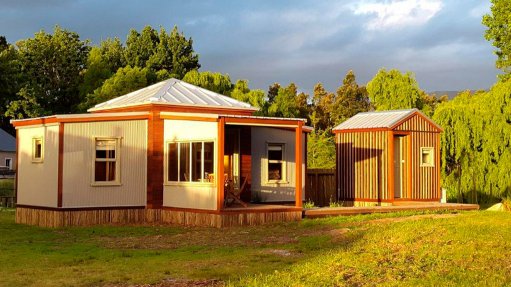
MODULAR DESIGN The small cabin is premade in Rustic Homes’s factory in Elgin, about 70 km south-east of Cape Town
Grabouw-based timber homes company Rustic Homes last month launched a rustic modular-design luxury housing solution, the Eco Cabin, which uses locally available materials unique to the Western Cape, onto the national market.
Rustic Homes MD Pieter Silberbauer tells Engineering News that a series of prefabricated components constitute the company’s new prototype product, and that the Eco Cabin, which is sold flat-packed, was first made available to Western Cape-based clients in November.
The small cabin is premade in Rustic Homes’ factory in Elgin, about 70 km south-east of Cape Town. Silberbauer says the unit is simple to set up on site and can be installed with a renewable- energy solution, as the cabin has been designed to operate using solar power and gas.
These environment-friendly energy solutions, along with a Rain Queen corrugated tank, which stores 1 000 ℓ water, are, however, optional extras.
“We have been aiming to provide a cost- effective, as well as an energy- and environment- conscious, solution for the holiday-home market without compromising on quality,”Silberbauer says.
The Eco Cabin makes full use of its 32 m2 footprint, which excludes the deck and outhouse. “There is no wasted space in the building and a reduced amount of material is used in construction, owing to its clever design for compact living. This unit is the antithesis of the big luxury beach house that comes with high rates and hefty electricity bills,” he explains.
Silberbauer highlights that the cabin’s living area is not only the “heart” of the home but also the centre of the structure. There is an open-plan kitchen in the rear and two bedrooms on either side of the main living area, which further offer bracing for the main structure. The front deck forms the fourth quadrant of the symmetrical unit.
While Rustic Homes is yet to market the Eco Cabin, Silberbauer says there is increasing interest in the housing solution: “People are aware of it and many have stayed in the prototype in Elgin.”
He adds that the market response has been positive, with discussions currently under way to find potential partners for the manufacture, marketing, sales and distribution rights of the product.
While the Eco Cabin is not the core business focus of Rustic Homes, Silberbauer says it provides an exciting new opportunity for the company.
The cabin is available in different levels of finishing, such as floors made from orientated- strand board or oak.
The internal linings of the cabin are spruce and externally they are predominantly clad with aluminium, which is well insulated for heat and cold. The windows are epoxy-coated aluminium, ensuring longevity and easy maintenance, with the roof being zinc aluminium. The option of an aluminium roof is also available for beachfront properties on the West Coast to provide protection against the corrosive effects of the environment.
Silberbauer says Rustic Homes makes a point of using local timber wherever possible in the construction of its structures.
“This is the perfect solution for people wanting a weekend cabin on a remote location. The Eco Cabin can also be established at resorts looking to set up shop in remote locations, as the installation is fairly simple, with little impact on the surrounding vegetation,” he concludes.